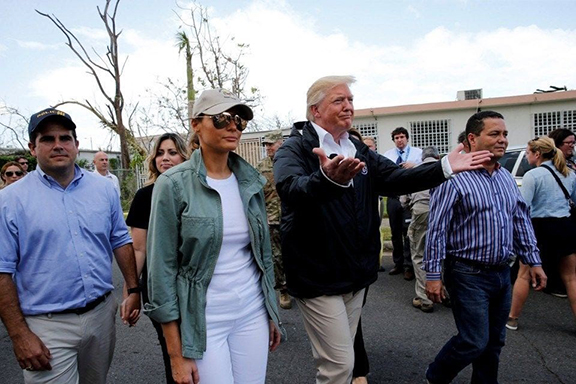President Trump is used to saying outrageous things without paying any political consequences, but his repugnant statement minimizing the nearly 3,000 deaths caused by Hurricane Maria in Puerto Rico last year may come to haunt him in November’s mid-term elections.
According to what Puerto Rico governor Ricardo Rosselló told me in a recent visit to the island, an estimated 200,000 Puerto Ricans have moved to the U.S. mainland since Hurricane Maria hit the island on Sept. 20, 2017, most of them to Florida.
While Puerto Ricans are U.S. citizens who don’t have voting rights on the island, they can vote when they live on the mainland. And many of them will run away from any candidate who is close to Trump.
Trump tweeted on Thursday that “3,000 people did not die in the two hurricanes that hit Puerto Rico” in September 2017, and that the figure was a made-up figure invented “by the Democrats to make me look as bad as possible.” He claimed, without citing any evidence, that the real figure had not gone up “by much” after the initial count of six to 18 deaths.
Trump’s statement was not only an insult to people’s intelligence but a monstrous offense to the thousands of Puerto Ricans who lost relatives and friends in the aftermath of Hurricane Maria, when lack of electricity in hospitals and drinking water shortages caused the largest numbers of deaths.
According to a study commissioned by the government of Puerto Rico to the George Washington University Milken Institute of Public Health, the death toll of Hurricane Maria was of 2,975. In May, another study by Harvard University published by The New England Journal of Medicine had put the number of deaths at 4,645.
During my visit to Puerto Rico, I couldn’t find anyone who would not blame the Trump administration for an incredibly slow response to the hurricane.
While Trump visited Texas four days after that state was hit by Hurricane Harvey last year, it took him 13 days to visit Puerto Rico after Hurricane Maria. And he visited the island only after a barrage of criticism in the media for his poor response to the Puerto Rico tragedy.
Nine days after Hurricane Maria had hit Puerto Rico on Sept. 20, 2017, Trump had sent 10,000 troops and 5,000 tarps to the island. Comparatively, nine days after Hurricane Harvey had hit Texas, Trump had sent 30,000 troops and 20,000 tarps, according to FEMA figures.
Gov. Rosselló, perhaps the most cautious Puerto Rico politician when it came to criticizing Trump, told me during my visit that the U.S. government’s response had been “inexplicably slow.”
He blamed it to “the bureaucracy,” and to the fact that the 3.3 million Puerto Ricans who live on the island are “second-class citizens” with no voting rights.
Rosselló has been notoriously kind to Trump in the past because he felt that antagonizing the mercurial U.S. president could result in a slowdown in federal relief aid to the island. In addition, Rosselló supports Puerto Rico’s statehood, for which he needs the support of Trump and Republicans in the U.S. Congress.
But after Trump’s tirade Thursday, even Rosselló felt urged to criticize Trump. Neither “the victims nor the people of Puerto Rico deserve to have their pain questioned,” Rosselló told CNN. He added that the death toll of 2,975 is “a very accurate” estimate.
The best indication that Trump’s callous statements about Hurricane Maria may cost him precious votes in November is how fast Trump-backed candidates are running away from the U.S. president’s claims.
Shortly after Trump’s tweets, Florida Gov. Rick Scott — one of Trump’s biggest loyalists, who is now running for a Senate seat — felt forced to tweet, “I disagree with POTUS (Trump.)” Likewise, a spokesman for Ron De Santis, the Trump-backed Republican running for Florida governor, said that the candidate “doesn’t believe any loss of life has been inflated.”
When even militant Trump supporters who are running for office in November feel compelled to criticize the president’s claim that Hurricane Maria’s death toll was concocted by “the Democrats,” it means that they smell trouble in the polls.
Trump has insulted Puerto Ricans and mocked their grief. His Republican party will probably pay a price for it in the polls, as it should.
U.S. President Donald Trump and first lady Melania Trump walk through a neighborhood damaged by Hurricane Maria in Guaynabo, Puerto Rico, U.S., October 3, 2017. REUTERS/Jonathan Ernst/File Photo










